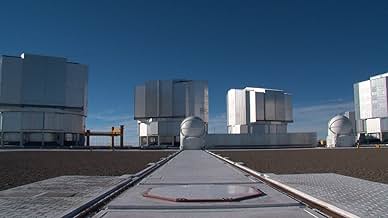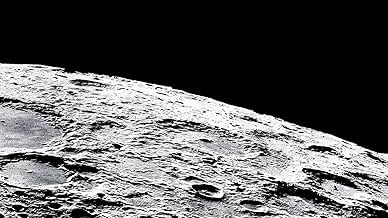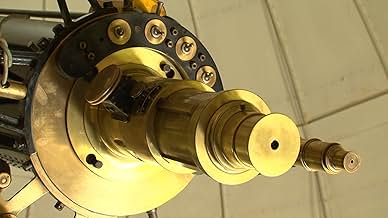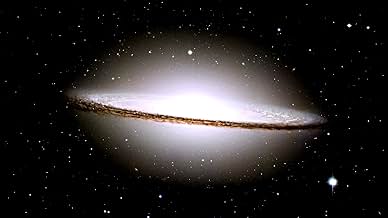Documental sobre dos búsquedas en el desierto de Atacama: una de astrónomos en busca de respuestas cósmicas, y otra de mujeres buscando restos de víctimas del régimen de Pinochet.Documental sobre dos búsquedas en el desierto de Atacama: una de astrónomos en busca de respuestas cósmicas, y otra de mujeres buscando restos de víctimas del régimen de Pinochet.Documental sobre dos búsquedas en el desierto de Atacama: una de astrónomos en busca de respuestas cósmicas, y otra de mujeres buscando restos de víctimas del régimen de Pinochet.
- Premios
- 13 premios ganados y 20 nominaciones en total
- Dirección
- Guionista
- Todo el elenco y el equipo
- Producción, taquilla y más en IMDbPro
Opiniones destacadas
Thanks Patrick for this film as needed.
What I found was that this isn't really a documentary in the traditional sense; yes it is real life and fact based, but we don't have a specific subject revealed or examined in the way you would expect from a historical documentary. Instead what we get is more of a musing or mediation that plays like a combination of documentary, poetry, art and science (non) fiction. This sounds pretentious but it really isn't and the way it is presented means that discussions about how there is no actual "present" and that our atoms come from the stars sit comfortably next to discussions with a woman whose parents were disappeared when she was 1 year old and a 70 year old who goes daily into the desert endlessly searching for bones of those dumped there decades prior. All of it works and is equally engaging and, more importantly, compliments each other in a way I didn't expect.
Content-wise the film has a real peaceful beauty to it while also looking at terrible situations with a lot of pain and loss. It is fitting that the film is also visually beautiful. The use of shots of galaxies spinning through the clear sky over the desert is a real help to this, but even smaller moments of a woman picking through dirt are really well shot and do not contrast with the shots of space. The visuals add to the content really well and I was surprised by how engaged I was; it wasn't that it informed me about a lot (although it did a bit) but more that it invited me to think with it, to muse with it and I really enjoyed that sensation.
As an idea it really shouldn't work at all and experience tells me it should have come out as a pretentious piece of soul searching like an art student did it, but it is nothing of the sort. It is beautiful, engaging, thought-provoking and really well filmed and constructed. Go with it – it is very good.
Yet both ignore the significance of an "insignificant" massacre that is conveniently concealed by Chilean society. The Pinochet regime. A military dictatorship that detained and slaughtered thousands of Chileans, obscuring the remaining evidence by moulding mass graves in the midst of the wilderness. A particulate in history that the modern Chilean populous have audaciously decided to ignore. However, a selection of zealous women scout the Atacama landscape foraging for fragments of shattered bones, in the glimmering hope that the remnants of their beloved will be uncovered. The human tenacity tested. A near impossible task for peace and solace. Scouring the desertification of the past, to seek comfort for the future. Much like astronomers and archeologists, these women are on the same emphatic journey for answers. All delving into the past to establish a greater understanding.
Guzmán's cinematic diary, whilst tackling the sociopolitical ignorance of the Pinochet dictatorship, existentially challenges the national application of insufficient accountability through the metaphoric connectivity between the regime's outlook and astronomy. Two initially diverse subjects somehow manufacturing a multitude of succinct links that convey the ferocious human spirit. Transitioning between various professions, utilising articulate interviews and profound commentary, to devise various associations that elude to a thematic symbiotic relationship. The female individuals foraging the desert for splinters of calcium, in the form of bone fragments, whilst astronomers scan calcium levels within the remnants of stars. Guzmán visually comparing the two through the usage of still slides. Commencing with close-ups of asteroids and moons before metamorphosing the images to bone fragments, assimilating an indistinguishable identical form. Cinematic examples such as the aforementioned further enhance the interchangeable thematic quest, searching for fractured past life in the present.
Various connections may initially seem tenuous, especially when focusing on the survivors from the Chacabuco concentration camp, but that's where Guzmán's enlightening commentary comes into fruition. Describing Lawner's time at Chacabuco, whom was referred to as an "architect" for his acute ability in memorising the prison's infrastructure by systematically counting how many steps dictated each wall, may originally seem insubstantial. Until Guzmán concludes his interview with a scholarly comment regarding Lawner's wife. The couple are a metaphor for Chile. He remembers the past, she, whom is suffering with Alzheimer's disease, is forgetting.
Circling back to the primary purpose of Nostalgia For The Light. We should never forget, but instead remember. To educate ourselves into uncovering our own origins. Bolstered by provocative imagery, with much applause aimed towards Dijon's exquisite cinematography (except the commonly used stardust filter that cheapened the cinematic quality of the documentary), and poetic narrative flow, Guzmán relentlessly tackles the parallels time offers to humanity. Physically transporting us on a self-discovering journey across the cosmos and the sprawling ground beneath our ignorant feet. We expend substantial amounts of time surveying remnants of remnants in a bid to discover answers, yet those who do not are unable to understand their past. There is no beginning or future to them. Only existence as a shell. "Compared to the immensity of the cosmos, the problems of the Chilean people might seem insignificant. But if we laid them out on a table, they would be as vast as a galaxy".
Until I watched it, I honestly didn't know that the best place in the whole world to search for light from the universe, also possesses the remaining of a mass tragedy that Chile went through. The movie brought these two things coherently, and it has this incredible comparison between a two distinct opposites, the beauty of the universe, and the ugliness of ourselves.
Somewhere in the movie one has to ask himself many questions. In a universe this vast with endless dots spreading all over its unbelievably ample space, with each dot as a whole star, smaller, similar or larger than the Sun; why do teeny tiny humans on Earth act so blindly to each others?! What is the purpose of knowing what's up there a million light years away while we still can't understand or deal with what's just beneath our noses? How come we were able to develop such powerful telescopes to look deep into outer space but not being able to develop a clearer insight to our own kind? And, how absurd it is to seek political power at any cost.
This beautiful movie provokes such questions and more, using the hardest way imaginable. Beautiful, but sad documentary.
We are firstly greeted with an array of huge vistas of space, images taken from the various telescopes trained on the universe. They are glorious to look at and so huge in scale they make you feel insignificant. As the film progresses we are introduced to a new story, that of The Disappeared, the thousands of people who went missing during the years of Chile's Pinochet regime in the 70's. We meet relatives who still hope that the remains of their loved ones will be found, so they can finally be laid to rest. Pinochet had a series of concentration camps in the Atacama desert, once they were salt mines. Prisoners were killed and their remains scattered through the desert. How many, or exactly where, is something unknown. For decades, relatives have come to the desert and spent countless days digging and searching for remains, body parts, fragments of bones. Occasionally remains are found, a closure for somebody somewhere.
The relatives we meet are full hope that they will find the remains of the loved one missing for over 30yrs. They long to have that knowledge, that piece of mind and that's why they return. It is devastating to hear these people, all women, talk. They talk of the hope they have at the start of each day and the despair that takes over after a fruitless day. They talk of being able to die at peace if they find their loved one. The idea that in modern times such atrocities were committed and that even today such little is known is so disturbing, showing the true horrors that humanity can commit. Yet through this horror, there is hope, small groups of people continue the fight to find loved ones and recover the truth.
The film draws on the parrallel that these two groups, the relatives and the star gazers lead simliar lives. They are both searching, searching for truth, for understanding. Both are working in the past, in that images from space are from the past, with light reaching us after something has happened, the relatives relive the past everyday hoping for some revelation. Somehow, despite the very obvious differences there is connection. Much of the connection and the film itself comes from the idea of space and scale. Footage of the Atacama shows it's immensity, small dots of humans work their way across tiny areas of a seemingly endless expanse. Mountains rise up, a toy like train crawls across the land. Even the telescopes are immense, the buildings they stand in, the mechanisms that run them are simply huge. The images, so huge and almost overwhelming fill the screen, just as the huge task that those searching for remains, searching for truth, fills the heart.
It is a beautifully made film, that is at once both fascinating and immensely sad, but offers hope that perhaps we live in a better time and that people are have been able to help keep the past alive.
More reviews at my site iheartfilms.weebly.com
¿Sabías que…?
- TriviaIncluded among the "1001 Movies You Must See Before You Die", edited by Steven Schneider.
- Citas
[last lines]
[in Spanish, using English subtitles]
Gaspar Galaz - Astronomer: [voiceover] I am convinced that memory has a gravitational force. It is constantly attracting us. Those who have a memory are able to live in the fragile present moment. Those who have none don't live anywhere. Each night, slowly, impassively, the centre of the galaxy passes over Santiago.
- ConexionesEdited into P.O.V.: Nostalgia for the Light (2012)
Selecciones populares
- How long is Nostalgia for the Light?Con tecnología de Alexa
Detalles
- Fecha de lanzamiento
- Países de origen
- Sitio oficial
- Idiomas
- También se conoce como
- Nostalgia for the Light
- Locaciones de filmación
- Productoras
- Ver más créditos de la compañía en IMDbPro
Taquilla
- Total en EE. UU. y Canadá
- USD 163,962
- Fin de semana de estreno en EE. UU. y Canadá
- USD 5,664
- 16 ene 2011
- Total a nivel mundial
- USD 410,903
- Tiempo de ejecución
- 1h 30min(90 min)
- Color
- Mezcla de sonido
- Relación de aspecto
- 1.85 : 1







